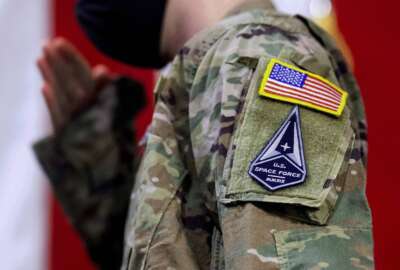The Space Force wants potential recruits to know they don’t have to be models of strength and fitness to be Guardians — they just need a healthy lifestyle. A new fitness monitoring program offers guardians an alternative to traditional military physical fitness testing.
The need for brains over brawn drives the calculus behind the fitness program. The Space Force leaders want to open the door to recruits who might otherwise be reluctant to join the military. Guardians have an opportunity to volunteer for the two-year test program that takes a holistic approach to fitness as an alternative to testing in the form of activities like pushups and running.
“The way they serve is different. And it’s often enabled by computers and through technology. We don’t have to have exactly the same talent management process, the same accession process and physical testing process,” said Alex Wagner, assistant secretary of the Air Force for manpower and reserve affairs.
The test program will look at health and fitness for service members in a new way that is meant to be more inclusive of different body types and different fitness levels.
“Instead of once or twice a year getting ready to take a PT test, and making sure that your height and your weight and your body conform to what was within standard, we would have the option for continuous fitness monitoring,” Wagner said at a Center for a New American Security national security conference Tuesday. “Those people who aren’t necessarily required to meet a certain physical standard to do that job would still be allowed to [be part of] a healthy force.”
The holistic health approach has three parts. The performance health optimization emphasizes nutritional guidance, physical activity, sleep hygiene and stress management along with avoiding harmful substances. It includes the Air Force body composition standards, which measure body fat distribution according to height and weight.
The education part of the program works to increase positive behaviors and build on guardians’ existing military education for prevention skill-building.
A final part of the program is a continuous fitness assessment study to be conducted by the Air Force Research Laboratory. Part of the mission is figuring out whether wearable fitness devices are an effective means of measuring physical fitness and readiness, including cardiorespiratory/muscular fitness and musculoskeletal injury risk.
The wearable fitness device measures activity and other biometric data. A written statement from Space Force said care will be taken to protect the privacy of data gained from the devices. Wearers only have to use the device during physical activity and they have the ability to turn off the GPS.
“Data imported from the wearable device manufacturer will be limited to fitness data required for the program and be stored in a system that has been evaluated for cybersecurity compliance and granted an authority to operate,” the statement said.
The program will be run by Guardian resilience teams at every Space Force base, as well as a virtual team for Guardians who are in remote locations. The resilience teams include a strength trainer, a mental health provider and physical therapists, among other specialists.
The two-year test program will run on a strictly volunteer basis, and Space Force leaders want it to provide an incentive for those potential recruits who have technical skills, but would prefer a different approach to fitness.
“We’ve got to be able to get a different type of person who was propensity to serve, but might see themselves as not really willing to do the stereotypical military model,” Wagner said.
Copyright
© 2024 Federal News Network. All rights reserved. This website is not intended for users located within the European Economic Area.

